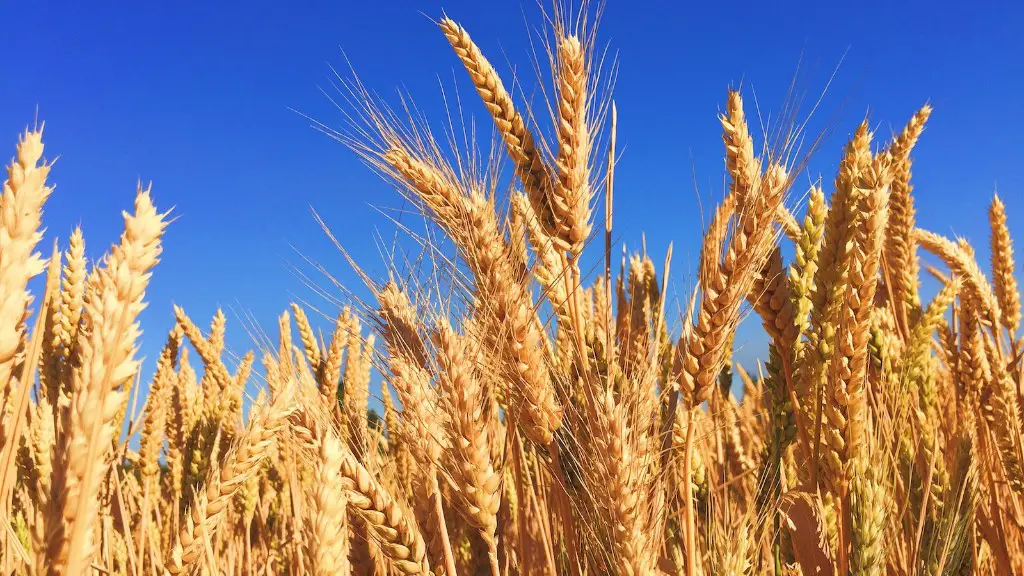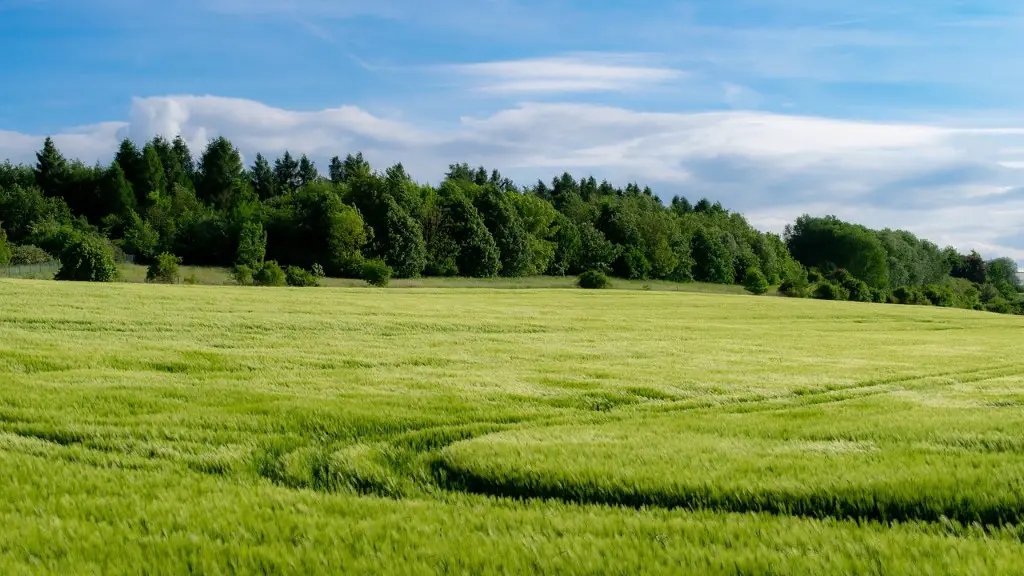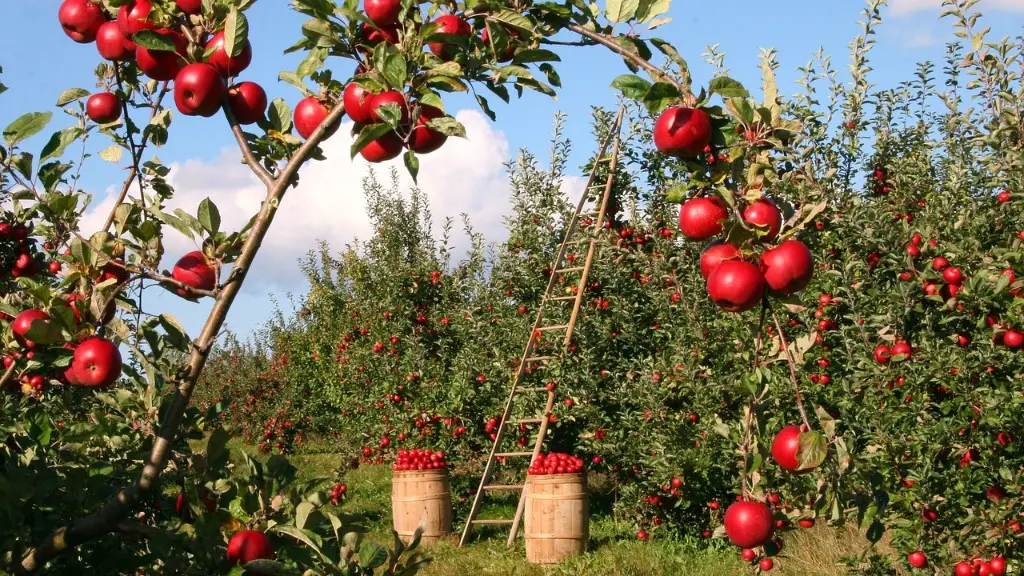Agriculture has had a significant impact on human history and the development of our world, but with its rewards and benefits come a few drawbacks. In this article we shall explore the positives and negatives of agriculture and its effects on our societies.
First of all, when it comes to the positives, it can’t be denied that the invention of agriculture has been beneficial for soldiers and the population at large. Not only has it provided food for the hungry, but it has also provided more accessible sources of food and allowed people to sustain larger populations, enabling the growth of complex societies. With the provision of a steady food supply, communities were able to organize themselves around farming towns and cities. This in turn helped promote inventions and led to the establishment of industrial infrastructure.
In addition, due to the vast array of different foods produced by agriculture, diets were diversified and expanded. People started consuming a wider range of nutrition, leading to better health and a greater ability to resist disease which has had a long lasting impact. Agriculture has even provided us with a range of fabrics and fibres, used to make clothing and other goods, which has extended our capabilities in many fields.
However, on the negative side of things, the focus on agriculture has also meant that humans are much more dependent on a single food source. This can leave them vulnerable to crop failure, as well as competition for resources due to the increasing populations. Even in the present day, food insecurity is still a major issue in many regions.
Equally, while agricultural practices have led to greater populations and higher productivity, they also rely on resource intensive methods such as chemical fertilizers, herbicides and pesticides which can lead to environmental pollution and ecological destruction. The intensive use of land has resulted in the destruction of habitats, the introduction of foreign species and the depletion of wild flora and fauna. These changes have affected natural systems which humans rely on for their food and habitat.
Lastly, another problem associated with agriculture is its unsustainable nature. With increased demand for land leading to over-cultivation and over-harvesting, the topsoil that is necessary for agriculture has been rapidly decreasing. The subsequent erosion of soil can lead to a decrease in crop yields, leading to an increase in food scarcity in an ever increasing population.
Agriculture and Human Development
Agriculture has been instrumental in the development of human societies, providing the necessary means of sustenance that enabled social and technological advancements. From the origin of farming, humans have been able to produce greater amounts of food and advance their technology to develop new tools and methods of food production. This has also allowed fo greater stores of wealth, spurred on the formation of laws and regulations, and helped to spread knowledge, ideas and philosophies throughout the world.
Furthermore, agriculture has enabled the spread of education and knowledge, with printed books and magazines able to reach further distances. This has allowed for a much deeper understanding of the world around and the emergence of modern science and technology. Agriculture has also emboldened inventions in the medical field and has allowed for our understanding of health to progress, allowing us to care and save more lives.
In addition, the growth of societies has given our species greater opportunity to cooperate, allowing us to build more complex structures and carry out a variety of different tasks and activities. This allows for the emergence of individual intellectual pursuits and, eventually, for the growth of entire civilizations.
Agriculture has also allowed the practice of religion and the development of spiritual beliefs and philosophies. With the ability to feed larger populations, human societies were able to create a surplus of resources which enabled the growth of specialized communities, namely the clergy and other religious scholars who offered spiritual guidance and education. This is another key area of human development that has been heavily impacted by agriculture.
Finally, it is also important to note that the development of agriculture has allowed for an unparalleled level of global trade, enabling us to share our goods and knowledge with different cultures, languages and ways of life. This has been fundamental in our ability to cooperate with each other and has shaped our history and evolution as a species.
The Effects of Sustainable Agriculture
In addition to its contribution to the development of societies, modern agriculture has also seen a movement towards more sustainable practices. This has characterised the last several decades of the agricultural industry and is one of the most important and revolutionary changes in the industry to date.
The emergence of sustainable and organic agriculture is imperative to the development of a healthy and lasting food system. Not only does it provide a source of more nutritious foods, but it also advocates for the use of more environmentally friendly and safe farming practices, such as crop rotation and natural fertilizers and pest control. These practices not only preserve the earth’s resources and prevent the destruction of habitats, but can also provide a safer and healthier environment for those working in the industry.
Furthermore, sustainable agriculture also promotes the efficient use of resources, such as water and energy, lessening the need for artificial chemicals and heavy reliance on fossil fuels. It provides diversified and locally grown foods, meaning that food can reach a local market without needing to be transported over long distances, reducing transport-related emissions.
Finally, sustainable agriculture can also help reduce food insecurity and poverty. By promoting an industry based on renewable resources and ethical practices, it allows farmers to receive higher profits, enabling them to support healthier communities and provide better livelihoods.
The Effects of Intensive Agriculture
However, while modern agriculture has seen the rise of many more ethical practices, there is still a risk of the industry veering towards intensive farming. This type of agriculture is characterised by an emphasis on high yields in order to maximize profit. Techniques such as monocultures, chemical fertilizers and pesticides, as well as the use of genetic modification, are employed in this type of farming.
This can have a multitude of negative environmental effects, such as water and air pollution, soil degradation, biodiversity loss, and the destruction of habitats. Not only this, but it can also leave farmers vulnerable; with the focus on short term gains, they are put under pressure to increase yields with little care for their safety or the health of the environment. This can lead to exploitation and an overall decrease in profits for farmers.
Furthermore, the reliance on chemicals and intensive farming practices can have an effect on the health of consumers. If food is grown using too many artificial fertilizers and pesticides, not only can it be detrimental to the consumer’s health, but it can also damage the soil, meaning that crops are more vulnerable to disease.
Lastly, excessive use of land and resources can also lead to a decrease in crop yields in the long run, meaning a much larger input of resources is needed to maintain high yields of profitable crops. This type of farming is unsustainable and creates a system of dependence, leaving farmers and the environment vulnerable.
The Impact of Agriculture on Global Markets
Lastly, it is also important to discuss the global implications of the agricultural industry. With its importance to the global economy, it has become an incredibly powerful industry and with its influence, it has the potential to shape world markets and economies.
The growth of the agricultural industry has led to a greater emphasis on international trade, increasing global and regional specialisation. This has helped countries to specialise in regions they are most competitive in and allowed for the development of complex and more efficient value chains.
Furthermore, the trade of agricultural commodities is shaped by various market factors, such as global prices, competition and production yields, meaning that the business of agricultural trade and investment has become increasingly complex. Consequently, the global agricultural industry has become more competitive, with large multinational corporations dominating production and markets, squeezing out smaller producers and making it difficult for them to compete.
In addition, the boom in global trade has also caused a great deal of environmental damage. With products constantly being transported on large scale, emissions from transport vehicles, such as planes and ships, have seen a dramatic rise and the consequent global warming is becoming an increasingly concerning prospect.
Finally, the agricultural industry is also having a major impact on the health of consumers. With advancements in food processing technology and the growing demand for convenience foods, there is a noticeable shift away from healthier food options. This has led to a reduction in nutritional content, an increase in unhealthy additives such as sugar, and an increase in food-borne illnesses, leading to a greater prevalence of obesity and other diet-related diseases.




